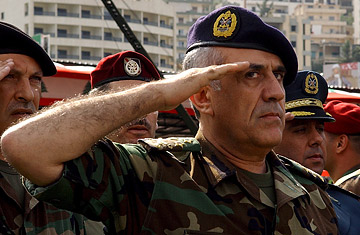
Michel Suleiman, President of Lebanon, salutes during a ceremony in Lebanon in 2007.
Welcomed by a 21-gun salute and a military band, Michel Suleiman, Lebanon's new President, took up residence Monday in the modern concrete-and-glass presidential palace set among the hilly suburbs of Beirut.
His election a day earlier promised an end to 19 months of grave political crisis, assassinations and sectarian street battles that brought this tiny Mediterranean state to the brink of civil war. It also marks a new chapter in Lebanon's tortured history, one in which the Iran-backed militant group Hizballah is now recognized as the country's dominant political and military force — at Washington's expense. Proof of that was quick in coming: Suleiman's first official meeting as Lebanon's head of state was scheduled to be with Manuchehr Mottaki, the foreign minister of Iran.
Most Lebanese are breathing a sigh of relief that civil war was averted after the violent clashes of two weeks ago, but Suleiman faces some unenviable challenges in the weeks and months ahead to preserve that peace and stability. Suleiman, 59, is the 12th president of Lebanon and a Maronite Christian, like all his predecessors, due to a sectarian power-sharing formula devised in 1943 when Lebanon gained independence. Since 1989, when the formula was adjusted, the President in Lebanon does not hold executive power — that authority belongs to the Prime Minister — but Suleiman stands to play an influential role as a conciliator between the country's rival political factions.
"He will be a crisis manager, not a crisis resolver," says Paul Salem, director of the Carnegie Endowment's Middle East Center in Beirut. Prior to his election as President, Suleiman was commander of the Lebanese army, an appointment he was accorded in 1998 under the auspices of Syria, which then dominated Lebanon. Since Syria disengaged from Lebanon in April 2005 following mass street protests, Suleiman has steered an even course amid feuding Lebanese factions. His priority has been to preserve the integrity of the Lebanese army, widely regarded as almost the only functioning state institution. Suleiman's profile rose considerably last summer when the army engaged in a bloody three-month battle against the Al-Qaeda-inspired Fatah al-Islam faction in north Lebanon. But during the recent street battles in Beirut, Suleiman studiously avoided deploying the army against the warring parties, worried that the military could unravel along sectarian lines.
